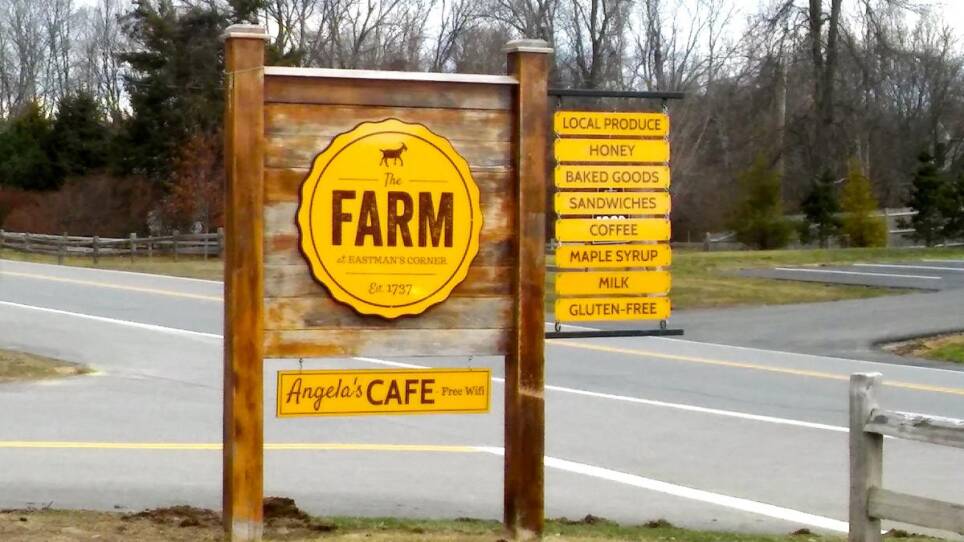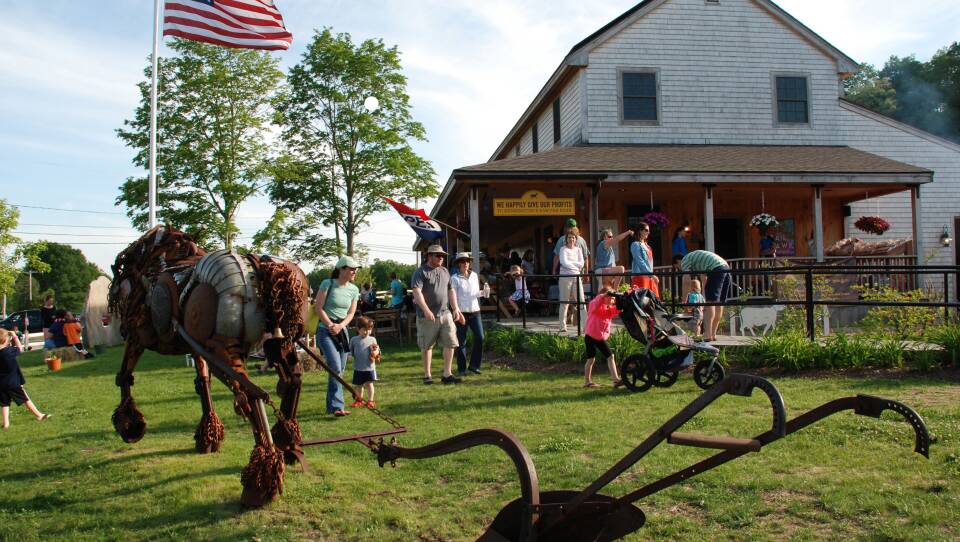For months, I’d been planning a winter visit to the farmer’s market at The Farm at Eastman’s Corner in Kensington, New Hampshire. I had visions of country roads with snowcapped fence posts and frozen ponds. I’d arrive in my puffiest coat, squinting through fogged glasses and rubbing my hands together for warmth while sorting through tubers and hearty greens. But El Niño has other ideas, and the mild weather spoiled my perfect winter vignette. Instead, it’s a 57 degree day in February — not that I’m complaining.
I gas up the car and head north with the windows down, arriving in Kensington from Somerville within the hour. I pull into the parking lot of Eastman’s Corner, taking a quick survey of the property. In the last four years, the philanthropic and conservationist Lewis Family Foundation has built a sleek operation here. The Farm Market is the centerpiece of Eastman’s Corner, providing a retail space for local produce and goods to be sold year round. In addition, there are 11 greenhouses growing produce for the market, the Food Barn — which houses two commercial kitchens — and a banquet space for regular long-table dinners. Rounding out the compound is the animal yard with potbelly pigs, goats, and a luxury chicken coup, “Cluckingham Palace.”

My contact here is General Manager, Sue Small. Longtime Cambridge residents may remember Small as the chef/owner of The Peacock restaurant, the spiritual predecessor to Craigie Street and Ten Tables Cambridge. After closing The Peacock, Small did stints at Star Market, Marche and Aramark, and was planning on retiring when Eastman’s courted her. I meet her on the deck of the Farm Market, where she welcomes me with a smile and a handshake, then leads me upstairs to her office.
I pull a chair up to her desk and Small fills me in on the history of Eastman’s Corner. What started as a farmstand and a single greenhouse is quickly evolving into something much bigger, and her background in foodservice helped shape the current business model.
“My theory, coming from supermarkets, is the more customers you can get in the door the lower your prices can be,” she says. “When I arrived, we started to look at the reputation of the place, which was that it was a little pricey for everyday people. We really looked at how we were managing everything and tried to find the right mix to keep us in business while supporting the needs of the community and farmers.” And it seems to be working. Eastman’s may be a non-profit, donating all its proceeds to nearby Sawyer Park, but a successful 2015 translated into 100,000 dollars raised.

Downstairs, Small shows me around the market. It’s a cozy space, tightly packed with artisanal treats from every category, priced below what you’d pay in Boston. The produce shelves are stocked with vegetables from Eastman’s and their partners. The dairy fridge offers milk in glass jugs and fresh eggs, while the freezer is filled with locally raised and butchered meats — and lots of ice cream.
“I can’t believe how much ice cream people eat in the winter,” Small says.
Our next stop is across the street at the Food Barn where I meet Karimah Nabulsi, who operates a catering company, Karimah’s Kitchen , specializing in Lebanese cuisine. The Lebanese born Nabulsi is as charismatic as she is warm. I’ve barely introduced myself when she starts telling me how much she loves it here. “I’m blessed and honored to be a part of Eastman’s Corner,” she says.

With mujadra and grape leaves cooking on the stove, the kitchen fills with familiar aromas and I know Nabulsi is doing something special. The retail arm of Karimah’s Kitchen is also doing well. The focus of the retail business is on providing customers with a variety of (mostly) vegetarian or vegan dishes made with fresh produce from the farm. She encourages people to mix her food with their own. “People know how to cook proteins, but they don’t always know what to do with vegetables.”
As she talks, Nabulsi starts pulling packages out of the fridge, laying out a selection of mezze and homemade pita chips. Thick, garlicky hummus, fresh tabbouleh, and savory shankleesh (goat cheese, herbs and tomato preserved in olive oil) blow me away. I’m taking notes and trying not to pig out in mixed company, but Nabulsi won’t have it.
“Eat,” she says. “That’s why I make it, so people can eat it.”
I’d be happy to stay here and graze the rest of the day, but I’ve taken enough of Nabulsi’s time. I thank her for feeding me as she packs a bag with leftovers to take back and “share” with my friends.

Small and I leave the kitchen to meet Rich Colburn, the head farmer. An unassuming guy, Colburn is the mastermind behind the system of greenhouses that keep Eastman’s Corner stocked with herbs and vegetables twelve months a year. He walks me through a number of the greenhouses so I can see the process from seedlings to mature plants. Most of the greenhouses aren’t heated, which surprises me. Colburn explains, “All you need to do is cover the crops. With a greenhouse, that’s two layers of frost protection and everything stays pretty warm.”
Our last stop is to the animal yard to hang with the goats. Upon seeing Colburn, they approach the fence to see if it’s feeding time. There are two generations of goats here, a dozen in all. Colburn runs down their names, including my favorite, Bill “Spaceman” Lee. They stand on their hind quarters to greet their caretaker, who pets them as they nibble on his fingers.

Small and I finally head back to the market, where I’m going to pick up a few things for home. She practically sings when she talks about Eastman’s Corner. She gushes about Colburn and Nabulsi while describing all the regular events held here like seasonal festivals, cooking demonstrations, and kids gardening activities. Sure, they’re useful tools to drive sales, but more importantly, they help create a sense of community. As she talks, I see a dad walk into the market with his two children, each of them holding an empty glass milk bottle to be refilled.
“You’re having a pretty good time here,” I say to Small.
“It’s hard to come here and be unhappy,” she says. “It’s an incredible place. It’s magic.”

The Farm at Eastman’s Corner - 267 South Rd., Kensington, NH, 603-347-1909,
eastmanscorner.com




